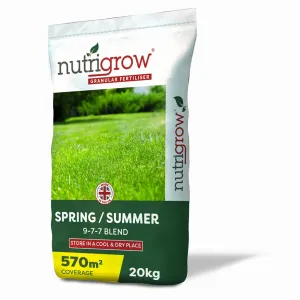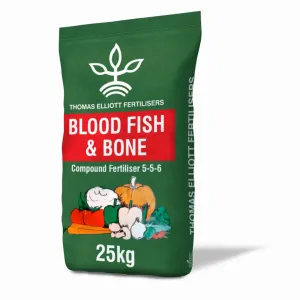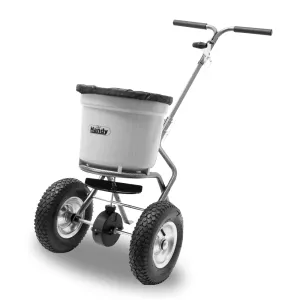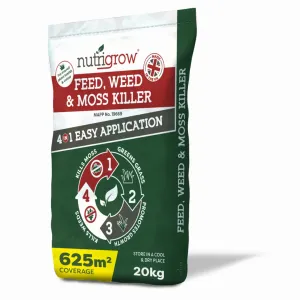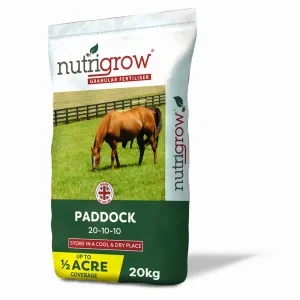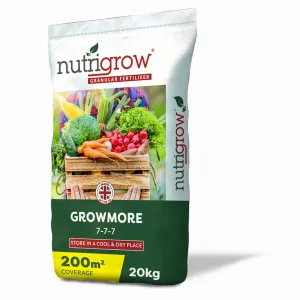The answer lies in what you are fertilising. Different formulations offer different benefits for ornamentals, fruit and vegetables, lawns or sports turf, pasture and trees.
Some boost growth, others will restrict top growth, some will weed as well as feed, and others will target moss in lawns. Many are formulated for use at varying times of the year too. But let’s start with the basics.
Core ingredients
Plants need three basic nutrients to grow: nitrogen, phosphorous, and potassium. Nitrogen helps a plant grow healthy leaves and shoots, potassium helps it grow flowers and fruits, and supports the transport of water, and phosphorous helps plants to develop strong roots.
These three macro nutrients are normally shown as N (nitrogen), P (phosphorous) and K (potassium) on the fertiliser’s product information. Numbers shown on the front of packaging refer to the ratio of these nutrients. For example, our Nutrigrow spring/summer 9-7-7 compound fertiliser contains 9% nitrogen, 7% phosphate and 7% potassium.
The nutrients help a plant to thrive but also equip it with the means to fend off disease and pests. Most all-round fertilisers contain these nutrients as well as trace elements to support overall plant health.
Organic or inorganic
Organic fertilisers are made up of plant and animal products (Blood fish and bone for example) whereas inorganic fertilisers are made from synthetic products that can deliver immediate benefits to plants.
Organic fertilisers by comparison normally need to be broken down by the soil to work effectively, but both organic and inorganic fertilisers contain the three core nutrients nitrogen, potassium and phosphorous.
Granular, liquid, or soluble
Then there is the physical make up of fertilisers – granular or liquid. Put simply, liquid fertiliser is immediately available to plants on application (once correctly diluted) whereas granular fertiliser must dissolve in water before plants can absorb it.
Granular fertilisers are generally longer lasting as they work through controlled slow release, meaning less applications are needed (though some quick-acting granular fertilisers are available) and the fertiliser will continue working for a longer period than their liquid counterparts.
Granular fertilisers can be spread by hand but are usually applied using a spreader - especially on large areas like sports pitches or paddocks.
Soluble fertilisers dissolve easily in water, so like liquid fertilisers, they offer immediate nutrient uptake. Their pre-diluted grain or powder formulation means they offer efficiency in terms of transport and storage – particularly important for those needing to fertilise very large areas.
Agrigem offers a huge range of granular, soluble and liquid fertilisers for a very broad array of uses - from general lawn fertilisers to specialist sports turf fertilisers, and from pre-seed soil conditioners, to specialist paddock fertilisers.
All of our specialist fertilisers are available to homeowners – giving you the unique advantages of the professional user in terms of supporting plant health.
Versatile fertilisers
Whilst the jury must remain out on the best all-rounder (because of the range of needs), the following fertilisers offer very good general plant health support.
For lawns, a fertiliser that kills weeds and moss, and greens up your grass offers a good all-round solution for lawns.
Our Nutrigrow Feed, Weed and Moss Killer is available in 20 and 5kg packs and contains a balance of 10% nitrogen, 2% phosphate and 2% potassium together with 8% iron sulphate to help improve the colour and strength of the grass.
For paddocks and pastures, our Nutrigrow 20-10-10 paddock fertiliser offers excellent standard treatment all year round. It will feed the grass for intensive hay production and gazing.
For ornamentals, trees, fruits and vegetables, our Nutrigrow Growmore 7-7-7 offers a balance of those key macro nutrients in a mini granular formulation that will promote strong healthy growth.
Agrigem’s range of fertilisers covers the complete range of use, making us the UK’s biggest online supplier. Take a look at our fertiliser pages for more information or get in touch with our technical team for specialist support.




